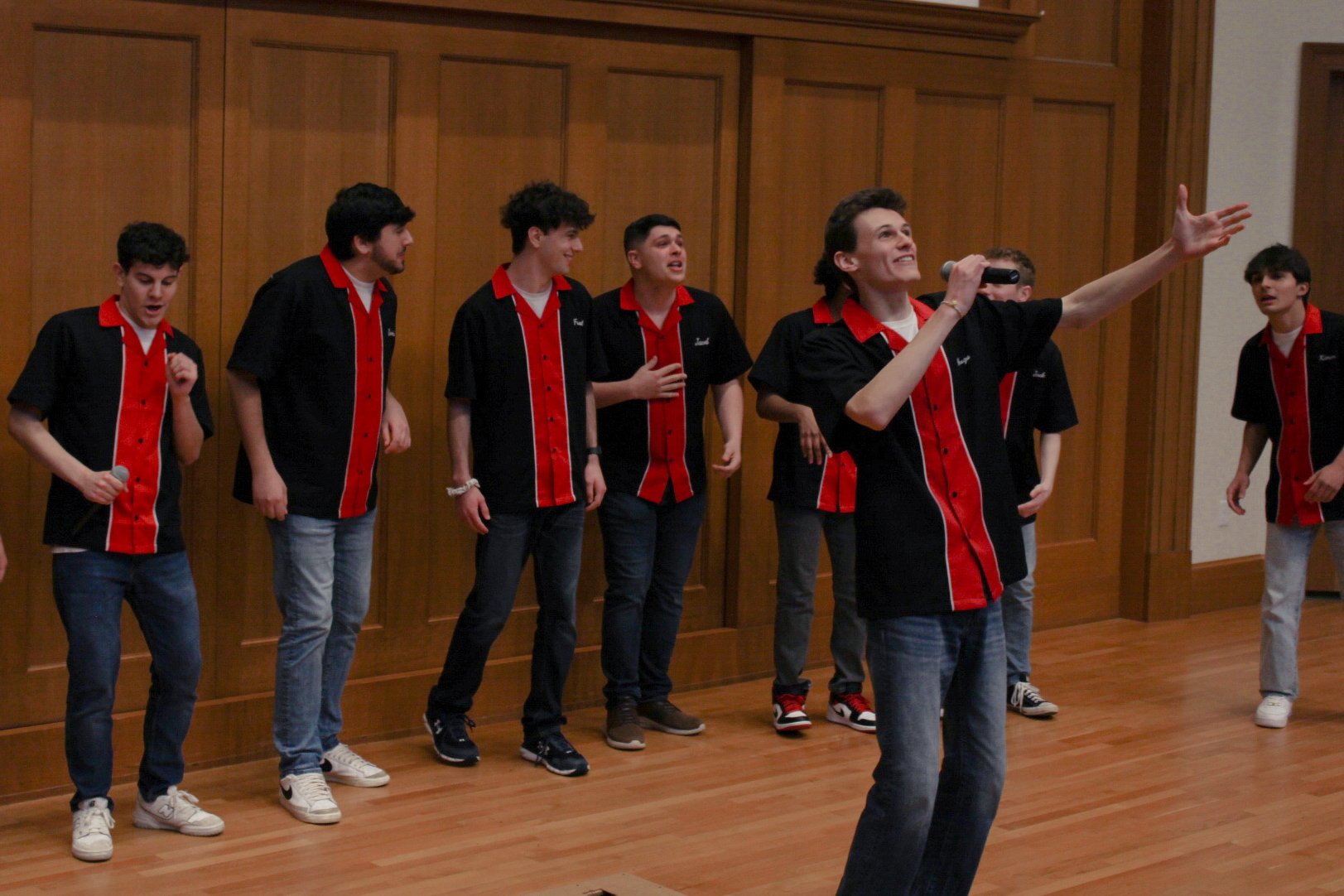Review: A Cappella’s Spring Invitational
Time Check performing at the A Capella Spring Invitational. Credit: Mary Kirk '27
Marist College A Cappella was proud to present their Spring Invitational on March 23, featuring The Sirens, Time Check and The Enharmonics, with a visiting group, The Rensselyrics, from Rensselaer Polytechnic Institute (RPI) in Albany, New York.
The Rensselyrics are RPI’s all-gendered a cappella group, founded in 1991, with self-produced albums released on all platforms. They also compete with other a capella groups regionally and perform at RPI events. The Rensselyrics showcased their wide range of musical talent by singing various styles of music, from the songs “No Tears Left to Cry'' by Arianna Grande to “Snow Angel” by Reneé Rapp, and finally a mashup of “Flowers x When I Was Your Man” by Miley Cyrus and Bruno Mars.
In their last piece, The Rensselyrics had soloists Gina Flores and Edwin Israel sing in a call-and-response style duet that showcased the beauty and emotion in both pieces. The audience could truly appreciate the soulful performance of each singer — and in both RPI’s and Marist’s ensembles, they visibly displayed emotional magnitude and incorporated personality into each song.
Each of the singers connected by interacting with each other, as they were smiling, dancing with one another and singing, almost as if to one another rather than to the crowd. It was touching to not only delight in the music they created, but to feel their high energy and watch them each experience the songs they sang.
Both acts of the show consisted of four songs sung by each group. In the first act, each group sang two songs, followed by a brief intermission. To start the first act, Marist’s all-male identifying a cappella group Time Check opened with a comical introduction to the show, following their performance of “Good Old A Cappella'' by The Nylons with several solos from John Sileo ‘24, Hugo Gizzi ‘26 and Jacob Andrews ‘24. This song relayed a message about finding brotherhood through song and delighting in the joy that music brings. It created a feel-good and happy-go-lucky mood for the rest of the show, in addition to highlighting the high energy and upbeat nature of each Time Check singer.
While singing this song and “Reelin’ In the Years,” Time Check enlivened their singing with enthusiastic facial expressions and engaging choreography that made for a spectacle of a performance that was both audibly and visibly stimulating. Time Check began their performance of “Hooked On A Feeling” with a dramatic chant of “ooga-chaka ooga-chaka'' that didn’t fail to bring audience members to laughter.
Following Time Check’s opening performance, The Sirens, Marist’s all-female identifying a cappella group, performed the song “Before He Cheats” by Carrie Underwood, featuring soloist Olivia Artuso ‘26. In this exhibition, the singers integrated stomping and clapping to maintain the song's beat and allowed themselves to really feel the music.
Marist’s all-voice a cappella group The Enharmonics sang a lively rendition of “Somebody That I Used to Know” with soloists Kailey Levinson ‘25 and Bella Obligado ‘26. Light choreography and emotionally charged singing created a moving and immersive experience for the audience. Each group’s energy matched the song they were singing and came to show the dedication these singers have for their craft, and for working with one another to create a beautifully orchestrated sound.
Each a cappella group had something unique to offer. RPI’s The Rensselyrics had a well-arranged and professional nature that was reflected in their voices. The ensemble clearly takes what they do very seriously and seems to get lost in the music while they perform.
Marist’s Time Check brings a comedic allure to their performance while maintaining perfectly executed notes and conveying their enjoyment while they sing and dance. The Sirens showcase their talent through various styles of music, such as pop and R&B. They reflected such passion through their singing of songs like “Always Be My Baby” and “No Roots,” and they appear to be genuinely enjoying themselves, especially while singing R&B songs.
Overall, the musical talent of each singer combined nicely with their collective expressionism, choreography and high level of investment in the songs they were singing. Each ensemble made a collective effort to produce an engaging performance that was entertaining to watch and even more enjoyable to listen to.
